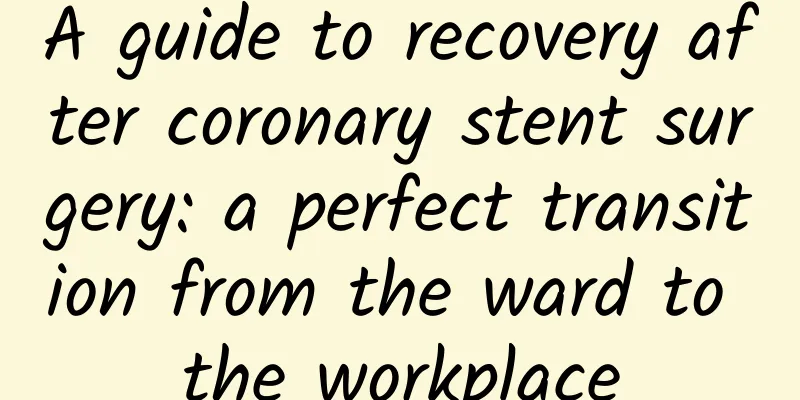A guide to recovery after coronary stent surgery: a perfect transition from the ward to the workplace

|
Author: Zhang Lixin, Chief Nurse, Beijing Anzhen Hospital, Capital Medical University Reviewer: Chen Qiling, Chief Physician, Peking University People's Hospital With the continuous advancement of medical technology, coronary stent surgery has become a ray of hope for many patients to regain a healthy life. However, the success of the surgery is only the first step. Postoperative care and rehabilitation are also crucial. From meticulous care in the ward, to adjustments to home life, to the challenges of returning to the workplace, every step requires careful planning and execution. After undergoing coronary stent surgery, the moment the patient returns to the ward, meticulous care begins. Medical staff will closely observe the wound at the puncture site, especially the radial artery or femoral artery puncture site, to check for bleeding, swelling, or ecchymosis. If any abnormality is found, the medical staff should be informed in time, and the pressure bandage or hemostat should not be removed without authorization. At the same time, patients should be encouraged to drink 800-1000 ml of water (drinking in divided doses) within 6 hours after surgery, and ensure that the urine volume is not less than 500 ml within 4 hours after surgery to promote the excretion of contrast agent in the body. Figure 1 Original copyright image, no permission to reprint In addition, taking medication as prescribed by the doctor is the key to postoperative recovery. In particular, antiplatelet drugs, such as enteric-coated aspirin tablets, must be taken on time to prevent thrombosis and stent thrombosis. Regarding the selection of puncture sites, the radial artery is generally the first choice, but if the radial artery puncture is unsuccessful, the femoral artery may be selected as an alternative. For patients who have undergone femoral artery puncture, the recovery requirements are more stringent. Patients need to rest in bed and immobilize the lower limb on the puncture side. The specific immobilization time and activity arrangements need to follow the doctor's advice. After discharge, home care and lifestyle adjustments become the key to the patient's recovery. After coronary stent surgery, patients need to take antiplatelet and lipid-lowering drugs for a long time. Antiplatelet drugs such as enteric-coated aspirin tablets (need to be taken on an empty stomach), clopidogrel or ticagrelor should be taken on time as prescribed by the doctor to prevent thrombosis. Statins, lipid-lowering drugs, help stabilize plaques, lower low-density lipoprotein cholesterol levels, and improve the prognosis of coronary heart disease. During the medication period, patients should pay attention to the adverse reactions of the drug. If serious adverse reactions occur, such as gastrointestinal bleeding, typically manifested as black stools, they should seek medical attention immediately. In terms of diet, you should maintain a low-salt and low-fat diet, with daily salt intake controlled within 5 grams and fat intake not exceeding 25 grams. Try to choose low-oil and low-salt cooking methods, and eat more vegetables and fruits in moderation to supplement multiple vitamins, which helps protect blood vessels and prevent constipation. Diabetic patients can choose low-sugar vegetables such as cucumbers and tomatoes. Moderate exercise is also an important part of rehabilitation. Patients can choose aerobic exercise such as walking, jogging, swimming, etc. to improve cardiopulmonary function. Everyone's physical condition and rehabilitation needs are different, so the rehabilitation exercise plan should be formulated by the doctor according to the patient's specific situation. Patients should follow the doctor's guidance to exercise. At the same time, patients also need to adjust their mentality, stay optimistic, and face life positively. Figure 2 Original copyright image, no permission to reprint For patients with coronary heart disease, quitting smoking is an important measure to prevent recurrence. Patients can quit smoking by using methods such as attention diversion, gradual reduction, auxiliary smoking cessation products or professional medical intervention. The amount of smoking is closely related to the risk of coronary heart disease, and the recovery effect of patients will be more significant after quitting smoking. If conditions permit, patients can undergo cardiopulmonary function assessment to further understand their health status. In addition, patients with coronary heart disease should also pay attention to controlling risk factors such as high blood pressure, high blood sugar and high blood lipids, and take relevant medications as prescribed by doctors. In daily life, patients should avoid excessive fatigue and mood swings, and maintain good work and rest habits. When patients are ready to return to work, they face new challenges in balancing health and career. Communicate closely with your doctor to develop a personalized work recovery plan to ensure that you do not ignore the body's signals in your rush to work. At work, plan work and rest reasonably, avoid long periods of continuous fatigue, and reduce unnecessary stress. For patients who need to travel, consult a doctor in advance and make adequate preparations, including understanding the weather at the destination, carrying necessary medications, and learning to rescue themselves in emergencies. If you experience any discomfort at work, such as chest pain or shortness of breath, you should take immediate action and take nitroglycerin sublingually if necessary, but patients with low blood pressure should use it with caution. In addition, regular check-ups are essential, and if you feel uncomfortable or your symptoms worsen, you should seek medical attention in a timely manner. |
Recommend
When the cold wind blows, my waist and legs ache. What should I do? See here →
As the weather gets colder, do you often feel sti...
Can I wear tight pants during early pregnancy?
There are many issues that women need to pay atte...
Can I eat Fuguizi during breastfeeding?
Pregnancy is a unique stage. Most pregnant women ...
Can I eat cheese during my period?
Many female friends are prone to heavy bleeding d...
eMarketer: More than 115 million people in the U.S. will shop on their smartphones in 2019
Social networks represent only a small portion of...
How to make girls' breasts bigger
Every girl wants to have a good figure, but girls...
How deep is a girl's vagina?
Many male friends have a small question, which is...
Causes of pain on both sides of the breast
There is pain on both sides of the breast. In tod...
What is the reason for the yellow-green leucorrhea with a fishy smell?
Leucorrhea is a substance produced by normal fema...
What will happen if I have a third abortion?
It is very common for young people nowadays to li...
Do you know these postpartum care knowledge?
Pregnancy and childbirth are one of the most impo...
Is it harmful to have an unclean period for a long time?
We all know that as a woman, she will have a mens...
Drinking kale powder makes you thinner? Can acai berry powder make your skin whiter? Check out this article!
Author: Xue Qingxin, one of the first nutrition i...
What causes stomach pain in pregnant women?
Pregnancy is a special period. Many complications...
What should women do if they have excessive vaginal discharge?
Leucorrhea is a secretion from the female vagina,...









